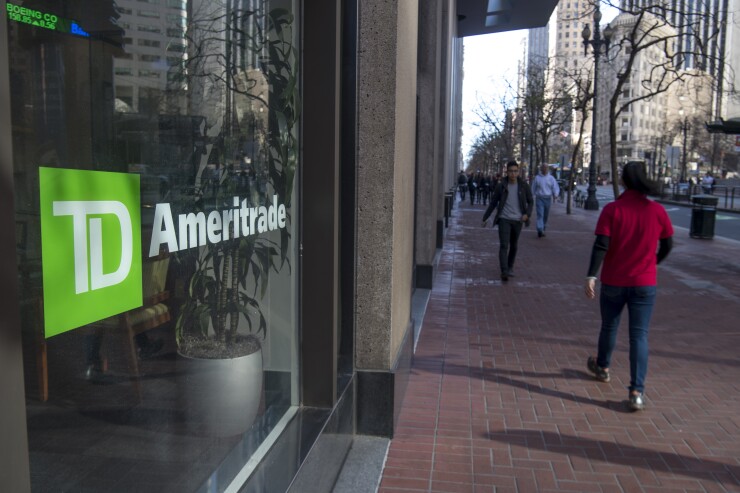(Bloomberg) -- Another day, another clash of the brokers' broadswords. One day after Fidelity Investments announced a fee cut for individual investors, and 12 hours after Charles Schwab followed suit, TD Ameritrade waded into the fray.
Late Tuesday night, the company said it had lowered commissions on standard online retail trading to $6.95, from $9.99, a trade. The lower rate also applies to options trades, though the company maintained its 0.75 cent fee on individual contracts.
The rates don't match those of its rivals. Fidelity and Schwab lowered retail commissions on online trades to $4.95, from $7.95 and $6.95, respectively, and moved from a fee of 0.75 cents per individual options contract to 0.65 cents. Fidelity is the nation's largest online retail brokerage, with 17.9 million accounts and $1.7 trillion in client assets as of Dec. 31, 2016.
"There is an effort underway in our industry to redefine value," Tim Hockey, TD Ameritrade's chief executive officer, said in a statement about the lower commissions. "While some are leading with price, our clients tell us it's much more than that."
After detailing the customer experience the firm offers clients, however, Hockey said that "with our pending acquisition of Scottrade on the horizon, we have a unique opportunity to enhance that experience in the future with lower pricing for all of our clients."
Some have already seen strong returns, with the top five posting more than 20% over the past year.
Vanguard Group on Friday lowered expense ratios for 68 ETFs and mutual funds. That was the third set of cuts by the company since December. State Street and BlackRock had lowered their ETF fees earlier in the year.
The moves fit into a larger trend, as the big brokerage firms vie for market share.
"There is an effort underway in our industry to redefine value," Tim Hockey, TD Ameritrade's chief executive officer said.
"We're in an era where people are demanding near-free everything, whether it's for an adviser, mutual fund, ETF, or on trades," Bloomberg Intelligence analyst Eric Balchunas said. "It's made it into everybody's brain that what they pay in fees will be a big determinant of what their return is, and that it's something they can control."

Sometimes the arms race over basis points (100 of them in a percentage point) and half basis points can get "silly," said Dan Wiener, editor of the Independent Adviser for Vanguard Investors. On Friday, for example, Fidelity ran ads in major newspapers comparing expense ratios on some of its ETFs and index funds with those of similar products at Vanguard. One ad showed a 0.045% expense ratio on a Fidelity S&P 500 Index fund next to the 0.05% charge for a similar Vanguard fund.
Fidelity soon found it had lost those bragging rights. New fund reports from Vanguard showed a 0.04% expense ratio for its S&P 500 fund, Wiener wrote in an e-mail to clients.
"One basis point on a $10,000 investment adds up to a whopping $1," Wiener observed.
One upstart firm took advantage of the fee-cutting scrum to take a shot at the giants of the industry. Commission-free online brokerage Robinhood said in a statement, "We're happy to see Fidelity lower its commission fees. Ideally, they would have eliminated them altogether, along with the required $2,500 account minimum."
Fidelity also lowered rates for investors who trade on margin, with money borrowed from their broker. The new rates span five tiers of assets, instead of six, and start at 8.325% for a balance of up to $24,999. Under the eliminated tier, you were charged 8.825% for balances up to $9,999. The rate on balances from $50,000 to $99,999 fell, from 7.235% to 6.875%, and on balances from $100,000 to $499,999, from 6.825% to 6.575%.
Schwab's margin rates remain higher than those at Fidelity, and TD Ameritrade's top Schwab's.
Fidelity hopes young investors, among others, will be attracted to its lower fees. "Millennials are starting to come into the market, and they represent a huge customer segment for the future," Ram Subramaniam, president of Fidelity's retail brokerage business, said. Last year, the company launched Fidelity Go, a robo adviser catering to "digital first" investors.






